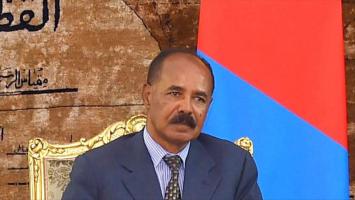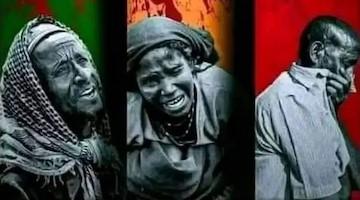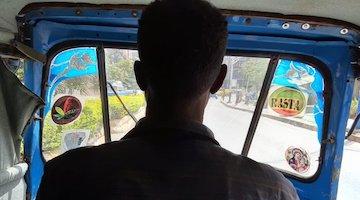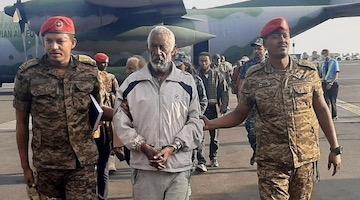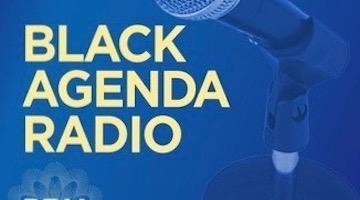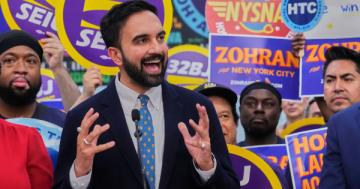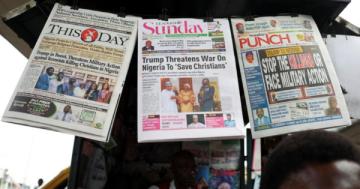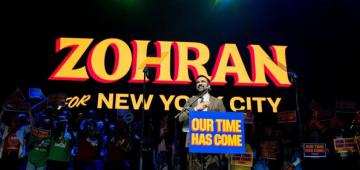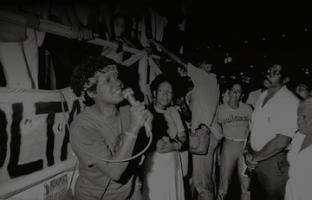Elias Amare enjoyed a long friendship with Glen Ford, who was Eritrea's only media ally for many years.
U.S. Special Envoy to the Horn of Africa Jeffrey Feltman recently returned from a tour of Ethiopia, Djibouti, and the United Arab Emirates. On the following Monday, the U.S. State Department issued a statement that it had imposed sanctions on Eritrean Defense Forces Chief of Staff General Filipos Woldeyohannes. Several days later, the UN Security Council (UNSC) met yet again about the Ethiopian civil war. I spoke with Eritrean American peace and justice activist Elias Amare about these developments.
Ann Garrison: Elias, what was your takeaway from the August 26th UN Security Council meeting? Did you hear anything we haven't heard there since the TPLF launched the war last November?
Elias Amare: There was nothing new. It was a continuation of what the US has been trying to do at the UNSC. The US and its Western European allies have been trying to pass some kind of resolution censuring Ethiopia that will lead towards military intervention, but so far, they have not succeeded. Why? Because China and Russia have been blocking it. They say that this is Ethiopia’s internal affair, and we shouldn't engage in any undue interference. Everyone is saying the same thing they have been saying all along.
The only new thing I heard is that now they are going farther with the “African solutions for African problems” angle that they keep talking about. The African Union is going to appoint the former President of Nigeria, Olusegun Obasanjo, as the High Representative for the Horn of Africa to try some kind of mediation.
But this is not really new. When the conflict started nine months ago, for example, the South African president tried some kind of mediation, but Ethiopia was strong and adamant that this is an internal matter. So what will Obasanjo accomplish? Not much, in my opinion, but we will see.
AG: I heard some Western members of the UNSC call on Eritrean troops to withdraw from Tigray, as usual. But I didn't hear anyone say that they have withdrawn. Are they still there? Or do you know?
EA: I don't think Eritrean troops are there. I'm not on the ground, but all information is that they withdrew in June. They are, however, continuing to monitor the border with Tigray in case the TPLF attack.
You remember how the TPLF started this by attacking an Ethiopian federal army base last November. Then, in order to widen the war, they launched rocket attacks into Eritrea. Not once, not twice, not three times, but 15 times. They fired rockets at civilian targets in Asmara, the capital of Eritrea, 15 times. Thank God the rockets didn’t hit any civilian population and no harm was done. But they tried and that pushed Eritrea to take measures to protect itself and to neutralize the heavy weaponry in the hands of the TPLF.
Once that mission was accomplished, Eritrea withdrew, in June. The latest statement from the US State Department says that Eritrea withdrew in June, but that now they have reentered, but look at what Samantha Power’s been saying all along: Eritrea must withdraw! Eritrea must withdraw! So how is it that they now acknowledge that Eritrea had withdrawn in June and yet for the past three months they have been harping on this withdrawal issue? I don't think they're serious. They're just creating a pretext to punish Eritrea.
AG: They’ve been demanding that Eritrea withdraw, but now they're alleging that Eritrea withdrew in June and it's re-entering.
EA: Yes.
AG: A week or so ago US Special Envoy to the Horn of Africa Jeffrey Feltman returned from a trip to Ethiopia, Djibouti, and the United Arab Emirates. Then, on the following Monday, the State Department announced that it was sanctioning Eritrean Defense Forces Chief of Staff General Filipos Woldeyohannes. What do you make of this?
EA: It’s just another bullying tactic. The target is ultimately the Ethiopian government. They want to frighten the Ethiopian government into accepting the TPLF as an equal and sitting down to negotiate with them, so they are adding sanctions on Eritrea first. The EU already sanctioned officials in Eritrea, but now the US is too. Basically, the language is, “If you don't oblige, the same thing will come to you.”
AG: The US has already sanctioned Ethiopian officials.
EA: Yes, but this is a threat that there’ll be more sanctions, and maybe an arms embargo.
As to the consequences of these Magnitsky Act sanctions on General Filipos Woldeyohannes, their immediate impact is nil because the general doesn't have any assets to freeze in foreign banks. He is a poor man, like all Eritrean leaders, who live a very modest life, a clean, corruption-free life, on their salaries.
AG: It’s hard to think of wars that were ended by negotiations rather than the victory of one side or the other. Do you think this push for negotiations is real or just another form of warfare and interference by the US?
EA: It’s intervention or ramping up for a humanitarian military intervention, as they call it, preparing the pretext for war. How can Ethiopia negotiate with a military force that attacked it internally? That was a treasonous act. The Ethiopian Parliament passed a resolution condemning it and designating the TPLF a terrorist organization.
The TPLF is guilty of heinous crimes, and no nation or political system would ever tolerate an attack on one of its army bases. Negotiation would make Ethiopia vulnerable to more terrorist acts from all corners of the country.
Ethiopia is in transition. It is consolidating its nascent democracy. The TPLF was in power for 27 years, from 1991 to 2018, and during those years it committed massive atrocities, horrendous crimes against the people until, finally, the people forced them from power.
Now the TPLF are attempting to seize power again, and to widen the conflict, to involve Eritrea and other neighboring countries. This would set a very dangerous precedent, not only for Ethiopia but also for the whole African continent. Why the US is insisting on this path is beyond me, but their immediate objective seems to be resuscitating or rescuing their longtime puppet and proxy, the TPLF.
The TPLF are criminals who must be brought to justice. Many of their leaders have already been apprehended, but some remain in Tigray or on other battlefronts. The government forces withdrew from Tigray and declared a unilateral humanitarian ceasefire in June, but the TPLF continued to fight and encroached further beyond its home base into the Afar and Amhara Regions. They are continuing to commit atrocities against the civilian population.
In the West, the crimes of the TPLF are hidden or glossed over, while the Ethiopian government and army are the targets of a massive media disinformation campaign.
The Western corporate media is incredible, outright brazen in the way it continues to manufacture stories of massacres and rapes and what have you, the same way they did in Libya and in Syria, where they manufactured the White Helmets, chemical weapons attacks, and what have you.
The pattern is the same and it continues.
AG: Have you seen any evidence that the TPLF actually want to negotiate?
EA: Why should they? They’re being protected and coddled by their Western backers, with Samantha Power in the lead. Their army is being sustained by food aid meant for the needy. Their troops are found with high energy biscuits meant for malnourished children. This is food aid that they snatched away from the population.
They have political and diplomatic cover from the West and the Western press, so they're continuing their brazen, belligerent attacks. They may say that they want to negotiate but that they have preconditions. Outrageous preconditions.
Then they turn around and say, “We will march all the way to the capital, Addis Ababa, overthrow this regime, and then settle accounts with Eritrea.”
They have raised a huge army. They are forcing children into conscription, and the West is looking the other way. So this is their last gambit. In the past month, they have tried everything they can, but the tide is turning on them now. They are on the run.
We hear these cries to negotiate, to give the TPLF respect and protection, whenever they are in danger of being decimated. Then the humanitarian interventionists call for a ceasefire and negotiations. But the TPLF are committing horrendous atrocities and nobody says anything. These double standards have been there for the past nine months since the TPLF ignited the conflict.
AG: Do you expect any kind of US or proxy military intervention beyond what's already happened?
EA: Well, all the signs are there. I cannot ignore the warning signs, the rhetoric seems to be heading towards that, but the population of Ethiopia and Eritrea are determined, and they have stood united.
After the Afghanistan debacle, the shambolic retreat, the US may want to create yet another war. The actors are the same in these forever wars that benefit only the military industrial complex. So with the ending of Afghanistan, they may be looking at the whole Horn of Africa. Who knows?
AG: Afghanistan doesn't seem to have ended, though it may be a drone war going forward.
EA: Yes, you're right. It’s an ending that hasn’t ended yet. That might make them hesitant to get overly involved in a new conflict, but again, who knows?
I think the public can have influence, but the corporate media is hopeless. Before the wars in Iraq, Libya, Syria, and Yemen, there were massive disinformation campaigns from the corporate media, but we in the peace movements have to continue exposing these lies. We have to bring the truth forward to make peace possible.
AG: Thank you, Elias, for speaking to Black Agenda Report.
EA: Thank you. I’m glad we’re able to continue the relationship with Black Agenda Report. For many years, Glen Ford was our only friend in the US media, as I wrote in “Farewell to Glen Ford, a True Friend of Eritrea.”
AG: One of the last things Glen said to me was that he was glad I was staying on top of this because he’d been too sick to, so I’m glad to carry it on.
Eritrean American Elias Amare is a journalist and a longtime peace and justice activist living in the San Francisco Bay Area. He and his work can be found on Twitter, @eliasamare.
Ann Garrison is a Black Agenda Report Contributing Editor based in the San Francisco Bay Area. In 2014, she received the Victoire Ingabire Umuhoza Democracy and Peace Prize for promoting peace through her reporting on conflict in the African Great Lakes Region. You can support her independent journalism on Patreon. She can be reached on Twitter @AnnGarrison and at ann(at)anngarrison(dot)com.

